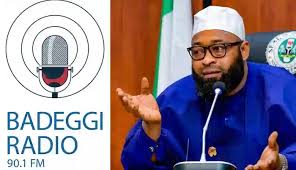
Daniel Otera
Badeggi 90.1 FM, a community radio station based in Minna, Niger State, went off air on 18 July 2025, following an executive directive by Governor Umaru Bago. The governor, speaking at an expanded caucus meeting of the All Progressives Congress (APC), accused the station of “unethical broadcasting and incitement”, and ordered that its licence be revoked.
“The daily activities of the radio station have been unethical,” Governor Bago told party leaders and government officials, justifying the sudden closure of the popular station.
The governor’s move has since triggered public outrage, with civil society groups, legal experts, and media watchdogs condemning it as an abuse of executive power and a threat to press freedom. Amnesty International Nigeria described the action as unlawful, warning that such moves undermine democratic principles.
“Governor Bago’s allegation against the radio station and his order to revoke its licence clearly show abuse of power and unacceptable intolerance of critical voices,” said Isa Sanusi, Director of Amnesty International Nigeria. “Under Nigerian laws, the governor has no power to order the closure of a radio station.”
Legal practitioners have pointed out that the power to issue, suspend, or revoke a broadcasting licence is vested in the National Broadcasting Commission (NBC) not any state governor. Section 2(1)(b) of the NBC Act clearly mandates the Commission to “receive, process and consider applications for the establishment, ownership or operation of radio and television stations,” and to “regulate and control the broadcasting industry.”
This legal position was reaffirmed by the Minister of Information and National Orientation, Mohammed Idris.
“The suspension of broadcasting licences falls within the purview of the National Broadcasting Commission, as stipulated by law,” the minister stated through his media aide, Rabiu Ibrahim.
He further revealed that the Niger State Government’s complaint had been forwarded to the NBC for investigation and urged all stakeholders to remain calm and law-abiding.
In June 2024, a Federal High Court in Lagos upheld the NBC’s authority in a case filed by the Socio-Economic Rights and Accountability Project (SERAP) and the Nigerian Guild of Editors, dismissing a challenge to the Commission’s enforcement powers. The ruling again affirmed that only the NBC has the constitutional mandate to take disciplinary actions against licensed broadcasters.
Data from the Media Rights Agenda (MRA) Press Attack Tracker shows that at least 69 attacks on journalists and media organisations were recorded in Nigeria in 2024 alone. Of these, 14 cases occurred in northern states, including Niger, Kaduna, and Plateau regions where reporters face high risks, especially when covering security-related issues.
In April 2024, two journalists from Daily Trust were reportedly detained while reporting on bandit attacks in Niger East. Although they were eventually released, the incident reignited fears over the shrinking space for press freedom in conflict-affected areas.
In November 2023, Kaduna State authorities similarly threatened sanctions against private broadcast stations that aired reports on communal clashes. Media advocacy groups labelled it a form of “media intimidation”.
In 2022, the Zamfara State Government ordered the closure of five media outlets NTA Gusau, Gamji TV, Al-Umma TV, Pride FM, and Vision FM for covering an opposition rally, despite a ban on political gatherings. Security agencies were directed to seal the stations and arrest staff who attempted to enter the premises.
The Nigerian Guild of Editors (NGE) condemned the action as “unconstitutional”, warning that “such a precedent could embolden other governors to undermine press freedom”.
Lanre Arogundade, Executive Director of the International Press Centre (IPC), called it a “dangerous trend of muzzling dissenting voices under the guise of sanitising the airwaves”.
Since its establishment in 2020, Badeggi FM had grown into a vital grassroots media outlet serving more than 25 local government areas in Niger State. Broadcasting from Minna, the station offered local news, public service announcements, and discussions on governance and development especially in underrepresented areas like Bosso, Chanchaga, Bida, and Shiroro.
“This radio station gave us updates about roadblocks and bandit attacks. Now we don’t know what’s happening in nearby villages,” said Ibrahim, a commercial motorcyclist in Shiroro.
The station had become particularly important in rural districts dealing with security threats. A 2024 report by SBM Intelligence ranked Niger among the worst-affected states for mass abductions outside the North-West, with over 2,138 reported abductions across 84 incidents between 2019 and March 2024. Many of these incidents occurred in Rafi, Shiroro, and Munya LGAs.
Observers say the vacuum created by the station’s shutdown could further isolate these vulnerable communities. Radio broadcasts had provided essential updates on bandit movements, safe travel routes, and government relief efforts services that are now missing.
The station’s director, while defending its editorial integrity, urged authorities to channel any grievances through the NBC, as required by law.
At the time of filing this report, Badeggi FM remains off-air. The NBC has not issued any official statement confirming whether the station will face formal sanctions or be reinstated.
“Freedom of expression is not a favour. It’s a right,” Isa Sanusi of Amnesty International reiterated. “Instead of gagging the press, leaders should focus on protecting lives and delivering on their responsibilities.”
